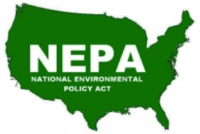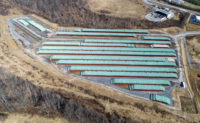The U.S. government's ability to weigh the social cost of greenhouse gas emissions in federal rulemaking—and with it the potential resumption of delayed leasing for oil and gas drilling on public lands—has been restored, following the U.S. Court of Appeals for the Fifth Circuit's March 16 stay of a lower court injunction that barred the Biden administration from using its social cost estimates in policy and rulemaking.
The social cost of carbon quantifies the climate impacts caused by each emitted ton of carbon dioxide. That, along with the social costs of methane and of nitrous oxide, have been used by the government to run cost-benefit analyses for policy and project-level decisions, such as permitting energy projects.
In an early executive order, the Biden administration restored an Obama-era Interagency Working Group disbanded during the Trump administration. The IWG had set an interim estimate of $51 per ton. Adjusted for inflation, it is roughly equal to the 2016 figure ($42 per ton) set by the Obama administration. The Trump figure, which was cut back to between $1 and $7 per ton, did not count global impacts in estimating the cost of emissions, which factored into IWG estimates.
The latest ruling comes as the administration has ramped up efforts to allow agencies to consider those emissions costs in their actions—from a March 21 proposed Securities and Exchange Commission rule to require publicly traded companies to report climate-related business risks, to the Federal Energy Regulatory Commission's recent policy change to expand consideration of impacts in approvals of natural gas infrastructure projects. Those will be further weighed at a March 24 FERC meeting.
In its order, the three-judge appellate panel said the plaintiffs in the 10-state complaint filed last year against the administration in a Louisiana federal district court lacked standing, contending that the states’ “claimed injury is ‘increased regulatory burdens’ that may result” from the GHG metric “hardly meets the standards for ... standing because it is, at this point, merely hypothetical.”
The administration had asked for the stay Feb. 19 while also appealing the lower court's Feb. 11 decision, which had paused the government's ability to apply its interim estimate in project analyses, including in NEPA reviews. In its request, the U.S. Dept. of Justice wrote that the injunction was affecting or inhibiting proposed rulemaking and actions, as well as delaying the release of program awards, such as for the Federal Transit Administration's Capital Investment Grants.
“The preliminary injunction halts the President’s directive to agencies in how to make decisions, before they even make those decisions,” said the appeals court.
Planned U.S. Interior Dept. oil and gas lease sales were put on hold because of the injunction and could resume, should the administration decide to go forward with the sales.
While the administration can now resume using its interim estimate, this is not the final say on the matter.
In a blog post, Kirkland & Ellis attorneys Jonathan E. Kidwell, Jennifer C. Cornejo, Tyler Burgess and Alex Noll said that future litigation could affect the now-allowed use of social cost of carbon estimates in current rulemaking. But if that use “were ultimately to be struck down, federal agencies may have to redirect resources to revise already drafted proposed rules and revise their regulatory impact analyses,” they noted.






Post a comment to this article
Report Abusive Comment